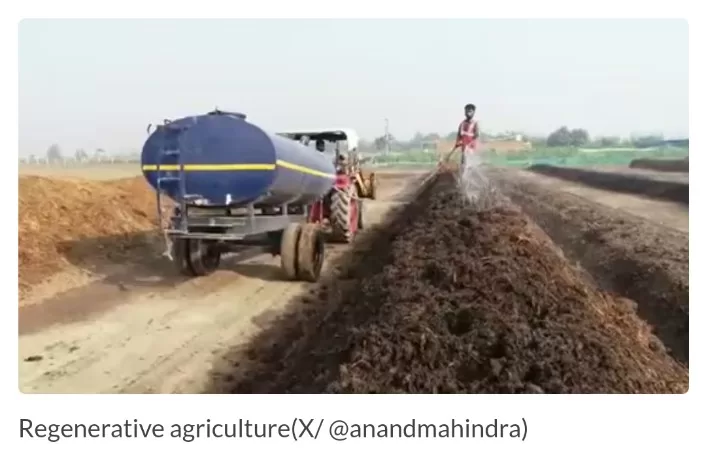New Delhi: Anand Mahindra, the Chairman of the Mahindra Group, has put forward a novel alternative to combat the persistent air pollution issues in Delhi and its surrounding areas, often exacerbated by stubble burning.
In a recent post on X (formerly Twitter), Mahindra introduced the concept of “Regenerative Agriculture” as a sustainable alternative to the environmentally harmful practice of stubble burning, which significantly contributes to the deterioration of air quality in the national capital.
“To address the pollution crisis in Delhi, we must consider the adoption of regenerative agriculture. This approach not only provides a lucrative substitute to stubble burning but also enhances soil productivity. Vikash Abraham of the Naandi Foundation is ready to support. Let’s embark on this journey!” urged Anand Mahindra, sharing a concise two-minute video elucidating the principles of regenerative agriculture on the microblogging platform.
Regenerative Agriculture:
Regenerative agriculture, as defined by the World Economic Forum (WEF), is a farming methodology that prioritizes soil health. By nurturing healthy soil, regenerative agriculture yields increased food production and nutrition, carbon sequestration, and an enhanced range of biodiversity. Furthermore, it aids in diminishing soil erosion, promotes efficient water utilization, reduces pest pressures, and bolsters biodiversity.
Key techniques encompass reducing ploughing to preserve carbon content in the soil, enhancing water absorbency, and safeguarding essential fungal communities. Crop rotation diversifies the types of crops planted, thereby enriching biodiversity, while the use of animal manure and compost replenishes soil nutrients.
It is noteworthy that a significant portion of global greenhouse gas emissions, approximately one-third, is attributed to the agricultural sector, which has also contributed to soil degradation and environmental vulnerability, according to the United Nations (UN).
Regenerative agriculture practices are being embraced across diverse regions worldwide, including Asia, Latin America, the United States, Canada, Africa, Europe, Australia, and New Zealand. Farmers in Tanzania and East Africa are integrating regenerative farming techniques into their cultivation of beans, bananas, maize, and commercial crops like cardamom.
Delhi-NCR Pollution: AQI Returns to ‘Severe’ Category:
On the environmental front, the air quality index (AQI) in the national capital reverted to the ‘severe’ category on Wednesday morning after a brief improvement to the ‘very poor’ category. As per data from the Central Pollution Control Board (CPCB), AQI readings for various locations in Delhi included Anand Vihar at 452, RK Puram at 433, Punjabi Bagh at 460, and ITO at 413.
In a parallel development, the Supreme Court issued directives on Tuesday, compelling state governments in Punjab, Haryana, Uttar Pradesh, and Rajasthan to halt crop residue burning with immediate effect. The court emphasized its commitment to preventing avoidable casualties due to pollution.







